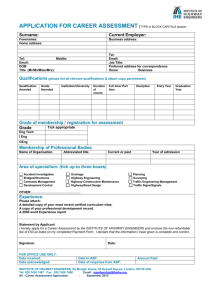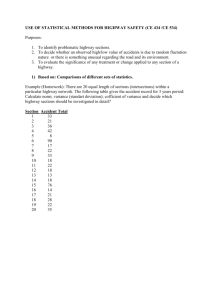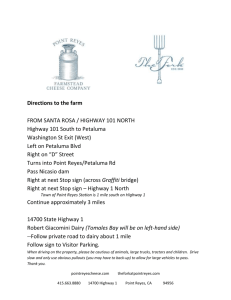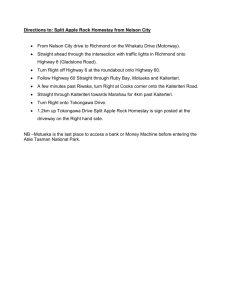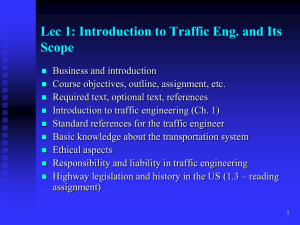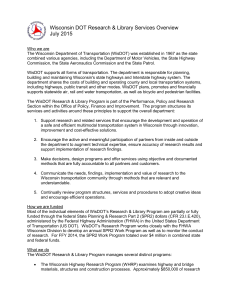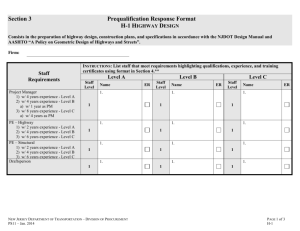County Highway Department's Accounting Systems
advertisement
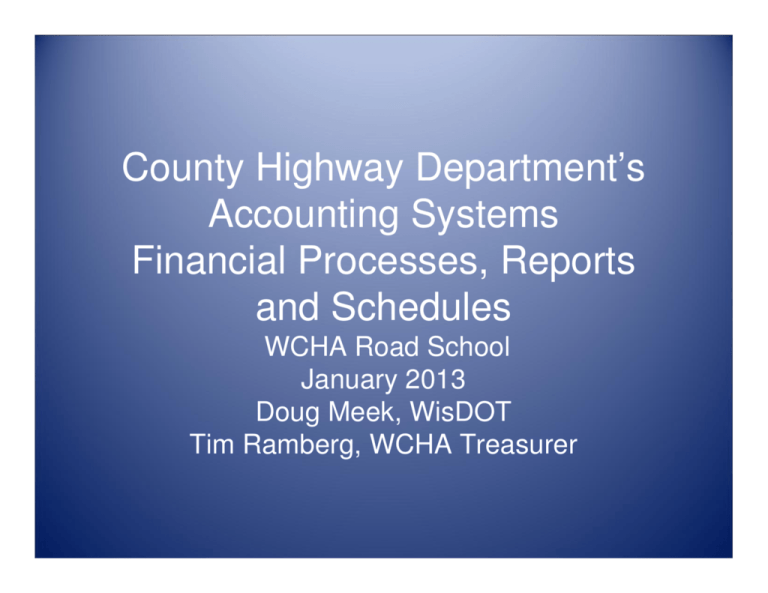
County Highway Department’s Accounting Systems Financial Processes, Reports and Schedules WCHA Road School January 2013 Doug Meek, WisDOT Tim Ramberg, WCHA Treasurer County Highway Departments have Varying and Unique Requirements • By State law (Chapter 83-County Highways…) • By WisDOT (Policies, Procedures, Manuals…) • By Departmental Policies/Procedures/Rules • By County Auditors (Independent auditors) • By County-wide Policies and Procedures • (Counties must keep the first two in mind when writing/modifying county-wide and departmental policies and procedures.) Ups and Downs of Highways • Accounting Cycle • Seasonal Cycles – Construction/Summer Season – Winter Season/Events • • • • Weather Cycles Emergencies Projects (Over multiple years) Various Time Periods and Cycles WisDOT Highway Maintenance Manual Basics Covered • • • • • • • • Policy and Procedures - Administration Roadway Maintenance Traffic Services and Safety Winter Maintenance Roadside Management Roadside Facilities Right-of-Way Use & Permits Emergency Response Unique Financial Processes • Accounting Processing: • Economic Decisions: – Financial Analysis – Tracks expenditure – Operational insight – Tracks revenues – Life Cycle Costs (years) – Yearly activity – Audit account accuracy – Reviews changes in activity – Long term value of a decision – Includes cost avoidance, labor savings, public service timelines, etc. Unique Accounting System Requirements • Typical System Modules – – – – General Ledger Payroll Accounts Payable Accounts Receivable • Additional Modules Needed – Project Costing • Over several years • Tracked by activity – Fixed Asset Inventory – Fleet Operations • Maintenance costs • Maintenance triggers – Labor hours tracked • Incidental Labor • Hours by job – Machinery hours/ops – Materials/Inventory • Parts • Fuels, etc. – Pits & Quarries – Bituminous Operations Unique Accounting Systems • General Ledger Accounting Systems – – – – – – – – – – • ALIO ACS J.D. Edwards Springbrook DataNow Financial Edge New World CMHC/Netsmart/Avatar Etc. Whatever your county has selected as there General Ledger (GL) software package. We look for Cost Accounting software that is capable of importing into the County’s General Ledger & Payroll Systems. • Cost Accounting System needs – CHEMS-PRO • • • • – – – – – – Most county highways WisDOT developed Web based Free to Highway Departments ACS Terry Esser (AS-400) J.D. Edwards Springbrook RTVision Others? Highway Cost Accounting System Needs • Software modules need to: – Set-up and track project costs – Track labor, machinery, material: • • • • Costs Units Time and Quantities used. – Contracted services used – Special Reports Construction & Maintenance Projects • • • • • • • • • Widening • Base Improvement • Hill Cuts/Vertical Realignment/Horizont • al • Total Reconstruction • Safety Enhancements• County-Aid Bridges • Bridge Replacement • etc • Surface Patching & Repair Chipseal Vegetation Control Drainage/Culverts Shouldering Safety Appurtances Accident Response Signing etc Highway Cost Accounting System Needs (Continued) • Software modules need to: – Manage pits & quarries inventory (including cost of goods sold) – Manage materials – Manage employees – Manage bituminous operations – Manage fleet (including maintenance triggers) – Manage equipment (including depreciation) – Manage inventory (including ordering triggers) • Culverts, blades, tires, batteries, vehicle parts Highway Accounting System Needs (Continued) • Software modules need to: – Invoice WisDOT and other units of government for work performed – Run required reports and additional reports requested by WisDOT – Run reports for managers (Used many times to assist in making decisions and as backup to decisions.) Year-End Process and Report Schedules • What does “year-end” process mean? • What happens to my account balances? • How are new billing rates set for: – – – – fringes; small tools; shop overhead; gravel or bituminous products? • Where are approved budget monies? Year end process and report schedules (Cont’d) • What schedules are important to management (Commissioner)? • What schedules are important to WisDOT? • Resources: – County staff (Office Manager/Accountant) – County audit firm – WisDOT staff (Cassandra Hebert) – WisDOT regional staff – Other counties Accounting 101 • “Accounting” defined: - A system of analyzing and recording business and financial transactions, and then… - Analyzing, reporting and verifying the results. • “Accounting period” – time frame for recording financial transactions (both month-end and year-end) • “Accounting cycle” – steps needed for recording of financial transactions (The “How to Manual for Highway Accounting”) Accounting 101 (Cont’d) • Highway accounting – performed by office manager/ accountant, and then transmitted to County Clerk’s office for “Official Recording” • Highway Financial Report – prepared by office staff, and then verified by County Auditor (Schedules are part of County Financial Report, submitted to State and used for reimbursement by both Departments of Revenue and Transportation) Highway Financial Reports • Required by Wis. Statutes 83.01(7)(d) to make annual report to WisDOT and county board on expenditures made and estimate of ensuing year’s maintenance costs. • WisDOT required report schedules – Annually required to complete 22 schedules that support operations and maintenance of highway department. (WisDOT Highway Maintenance Manual, Chapter 02-30-15) 22 WisDOT-Required Schedules • 1-Buildings & Grounds Ops. • 2-Highway Administration • 3-Other Administration • 4-Fuel Handling • 5-Shop Operations • 6-Year-End Shop Overhead • 7-Operation of Equipment • 8-Current Year Depreciation • 9-Bituminous Operations • 10-Pits & Quarry Operations • • • • • • • • • • • 12-Buildings Inventory 13-Machinery Inventory 14-Machinery Purchased 15-Machinery Traded-In 16-Machinery Sold 17-Machinery Discarded 18-Fringe Benefit Analysis 19-Field Small Tool Account 20-Materials/Supplies Anal. 21-Accounts Receivable 22-A/R-Due from State General Ledger Accounts and Account Balances • Balance sheet accounts carried forward include: – Asset accounts (what you own – buildings, equipment, cash, receivables, etc.) – Liability accounts (what you owe – payables, etc) – Equity accounts (what you are worth) General Ledger Accounts and Account Balances (Cont’d) • Income statement accounts closed out for current operations include: – Revenue accounts (money collected for services provided) – Expense accounts (money spent on providing services or operations) Billing Rates • Fringe Benefit Rate – Payroll related costs associated with highway employees (vacation, sick, holiday, insurances, etc.) • Small Tool Rate – Cost associated with inexpensive equipment used on multiple field projects and cumbersome to itemize • Shop Overhead – Cost associated with operating the highway shop (Indirect labor and fringes, supplies, tools, building cost) Billing Rates (Cont’d) • Gravel Products – Cost associated with operating gravel pits and quarries (Labor and fringes, equipment used exclusively in the pit, supplies, etc.) • Bituminous Products – Cost associated with operating bituminous plants (Labor and fringes, equipment used exclusively for production of mix, supplies, etc.) Note on Billing Rates • Calculated rates are required to be billed to WisDOT • Calculated rates are not required to be billed for non-WisDOT work (county could set rate higher or lower than calculated) • BETTER UNDERSTAND WHAT BILLING LOWER THAN CALCULATED RATE MEANS TO YOUR FINANCIAL Approved Maintenance & Construction Budget Money (Different Recording Options) • Option #1 – Approved county tax levy forwarded to highway at start of new year. Recorded by highway in general ledger, and money spent throughout the year. Remaining balance at year end stays in highway accounting ledger. Approved Maintenance & Construction Budget Money (Cont’d) • Option #2 – Approved county tax levy recorded by county clerk in transportation account. As money is spent throughout the year, the balance is drawn down with revenue recorded in highway general ledger. Remaining balance at year end stays in county transportation account for future highway spending. Financial Schedules for Commissioner • What schedules are important to the Highway Commissioner? (All are important as they reflect your highway operations for the year!) • Significant schedules include: – Maintenance Accounts (State RMA budget, County tax levy, Local tax levy) – Building & Grounds & Radio Operations (WisDOT reimbursable) – Machinery Operations (Used as funding source for equipment purchases) • Financial Schedules for WisDOT What schedules are important to WisDOT? • Significant schedules include: – Machinery Operations (Used to establish equipment rates) – Building & Grounds and Radio Accounts (WisDOT reimbursable) – Non-State Maintenance and Construction Accounts (Reimbursable for General Transportation Aids) – Fringe and Small Tool Accounts (Used to establish billing rates that require approval by Who to contact with Questions? • For explanations, questions or concerns on accounting or financial information in highway accounting system, contact: – County Staff (Office Manager or Highway Accountant) – WisDOT Regional Staff – Other Counties – WisDOT Staff (Cassandra Hebert, Doug Meek, or Mark Woltmann) Highway Statutes of Reference • Chapter 30 Navigable Streams • Chapter 32 Eminent Domain • Chapter 59 Counties • Chapter 60.557 Reimbursement for fire calls on Highways • Chapter 66 Sub-Chapter IX public works & Projects • Chapter 66.0301 Intergovernmental Cooperation • Chapter 66.0627(1) Special Charge on Tax Bill • Chapter 66.0407 Noxious Weeds • Chapter 66.1031 Widening of Highways • Chapter 66.1033 Curative Provisions • Chapter 66.1035 Rights of Abutting Owners • Chapter 66.1037 Beautification & Protection • Chapter 66.1003 Discontinuance of a Public Way • Chapter 82 Town Highways • Chapter 82.03(1)(a) Town Hwys-“Passable” • Chapter 82.05(3) Town Hwys-Passable a-s-as-practical • Chapter 83 County Highways • Chapter 83.42 Rustic Roads • Chapter 84 Trunk Highways (State) • Chapter 84.17 Bridge Inspections Requirement • Chapter 85 WisDOT • Chapter 86 Miscellaneous Highway Provisions • Chapter 86.02 Misc. Hwy Prov – Injury to Highway • Chapter 86.03(1) Removal of Fallen Trees • Chapter 86.04 Highway Encroachments •Chapter 86.06 Highways Closed to Travel; Penalties • Chapter 86.105 Contract for Snow Removal • Chapter 88.68 Construction/Drains Across Highways+ • Chapter 88.87 Road Grades not to obstruct drainage • Chapter 88.89 Roads not to obstruct watercourse • Chapter 91 Farmland Preservation-Ownership • Chapter 101 Dept. of Commerce-Various Regulations • Chapter 102 Workers Compensation • Chapter 103 Employment Regulations • Chapter 106 Equal Rights • Chapter 108 Unemployment • Chapter 295 Non-Metallic Mining • Chapter 342.40 & 346.94(13) Removing Vehicles • Chapter 343 Operators’ Licenses • Chapter 343.05(4) CDL – Exemptions • Chapter 345.05 Municipal liability for vehicle accidents** • Chapter 346.05 Exceptions to driving on the right • Chapter 346.072 Passing stopped highway machinery • Chapter 346.27 Persons working on highway • Chapter 346.51 Stopping, standing, parking outside business • Chapter 346.57 Speed Restrictions • Chapter 346.915 Snowplow following distances • Chapter 346.94(5) Injurious substance on hwy (snow) • Chapter 346.95 Penalties for debris on hwy (snow) • Chapter 347.45(2) Prohibited Tire Equipment • Chapter 348 Vehicle Size, Weight & Load • Chapter 349 Local Authority-Vehicle Powers • Chapter 349.11 Setting speed limits • Chapter 349.15 Modify Weight Limits & Classify Roads • Chapter 349.16 Special/Seasonal Weight Limits • Chapter 893.83 Claims Against Gov’ts – Hwy Defects** • Chapter 943.01 Damage to Property Highway Administrative Codes & Rules of Reference TRANSPORTATION – Administrative Codes • COMMERCE • COMM 8 Mines, Pits & Quarries • SPS 332 Public Employee Safety & Health (Comm32) • COMM 45 Mechanical Refrigeration DEPARTMENT of WORKFORCE DEVELOPMENT • DWD Chapter 80 Workers Compensation (WC) • DWD Chapter 81 WC – Treatment Guidelines • DWD Chapter 82 WC – Mining Damage Claims • DWD Chapter 290 Public Works (PW) Contracts • DWD Chapter 290 PW Contracts - Appendix A • DWD Chapter 293 PW Payment & Performance Assurance • DWD Chapter 294 PW Debarment Contractors DEPARTMENT of NATURAL RESOURCES • NR 102 Water Quality Standards for Surface Waters • NR 135 Non-Metallic Mining Reclamation • NR 151 Run-off Management • NR 40 Invasive Species • NR 300 Time Limits/Fees re: Waterway Permit+ • NR 320 Bridges & Culverts-Navigable Waterways • NR 341 Grading-Banks of Navigable Waterways • NR 345 Dredging Navigable Waterways • NR 350 Wetland Compensatory Mitigation ST. CROIX COUNTY ORDINANCES • ORDINANCE 17.60 County Highway Setbacks • ORDINANCE 17.65 County Sign Regulations • • • • • • • • • • • • • • • • • • • • • • • • • • TRANS RR1 Rustic Roads • TRANS 75 Bikeways & Sidewalks in Highway Projects • TRANS 200 Erection Signs on Public Highways • TRANS 200 Signs – Appendix A - Spec. Info. Sign Hwys • TRANS 200 Signs – Appendix B - Service (B/W) Signs • TRANS 200 Signs – Appendix C - TODS Signs • TRANS 200 Signs – Appendix D – Gen. Dir. Guide Signs • TRANS 202 Wisconsin Scenic Byways • TRANS 204 Town Road Standards • TRANS 205 County Highway Standards • TRANS 206 LRIP • TRANS 207 Bridges & Culverts • TRANS 213 Local Bridge Program • TRANS 214 Town Road Bridge Standards • TRANS 220 Utility Relocation • TRANS 230 Permits for Oversize/Overweight Loads • TRANS 231 State Highway Driveway Permits • TRANS 250 Oversize & Weight (OS/OW)–Size & Weight • TRANS 276 OS/OW - Vehicles & Combinations • TRANS 278 OS/OW - Exceptions • TRANS 277 Salt Storage • TRANS 280 Roadside Vegetation Management • TRANS 307 Standards for Load Securement • TRANS 510 TEA Program • TRANS 515 Contractual Service Procurement Questions? ???????
